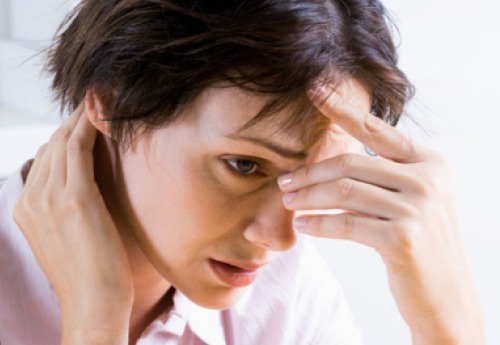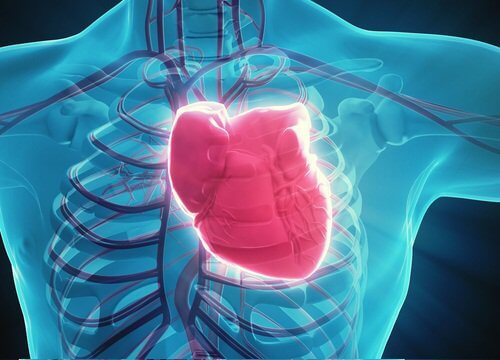Stabbing Chest Pains: When to Worry


Written and verified by psychologist Valeria Sabater
You have sharp chest pains when breathing. It feels like thousands of needles pricking your chest. Your breathing is restricted. What causes it? Is it a sign of something more serious? First, calm down. Keep track of the pain and how it changes. The majority of the time, stress or anxiety are the cause of these alarming pains. We’ll tell you more in this article.
Sharp, stabbing chest pains!

- Sit comfortably and try your best to remain calm.
- Remember that it will likely pass within a few moments.
- Relax and try to breathe calmly and slowly, exhaling through the mouth.
- Lastly, take your pulse, if you can. If you notice it’s high and accompanied with rapid breathing and pain extending into the neck or arms, seek medical assistance immediately. But, to reiterate, in almost 70% of cases the cause of these attacks can be attributed to anxiety or stress.
Cause 1: Anxiety or Stress

When you get home, you might get a headache or begin to feel dizzy. Even if it fades, the symptoms might reappear the next morning as you’re getting dressed for work.
Experts report that the highest number of heart attacks and other cardiac problems occur during the holidays and weekends. We’re supposed to be relaxing, but the body is incapable of doing so. When the level of cortisol in the body is too high, symptoms like stabbing chest pains begin to appear.
They can happen when you’re sitting down to dinner, watching TV, or talking on the phone. All of a sudden, you feel like you can’t breathe. Check out some of the most common causes of stabbing chest pain:
- Tense muscles. The tension becomes so great that it suddenly we’re unable to breathe properly.
- Vegetative hyperactivity (dizziness, rapid heart beat, and sweating. Classic tachypnea is characterized by rapid, intense breathing that can lead to stabbing pains in the chest).
What can you do to alleviate the symptoms?
First, relax, and begin breathing from the diaphragm. This allows the lungs to completely fill with air. How can you do this? Follow these steps:
- Sit comfortably.
- Place one hand on your abdomen, just above the navel.
- Breathe in slowly through your nostrils. Notice the movement of your hand and your belly rising.
- Hold the breath for 2 seconds.
- Purse your lips, like you’re about to blow out a candle.
- Exhale (slowly blowing) for four seconds.
You might like:
Heart Attack Symptoms Women Often Ignore
Cause 2: A Cardiac Problem

- Usually the occurrence of cardiac problems rises between the ages of 50 and 55.
- Previous symptoms: high blood pressure, high cholesterol, and a family history of cardiac ailments.
The first thing to do when you feel jabbing chest pains is sit down. Follow these guidelines:
- Calm down, and try to use the breathing pattern described above.
- How is your pulse? Is it fast? Irregularly alternating between beating fast, then slow?
- If the pain doesn’t stop after 5 minutes, or intensifies, seek medical attention.
- Also seek medical attention immediately if the pain extends to your neck, jaw or arms.
- Finally, if you notice pain accompanied with a strong tightness in the chest that restricts breathing, you should seek medical attention immediately.
You might like:
Types of Pain to Never Ignore
It’s essential to make sure the discomfort does not become too severe or lead to the symptoms described above. You can reassure yourself that it’s most likely anxiety, but you should still pay attention to what’s going on. Take care of yourself – you deserve it!
All cited sources were thoroughly reviewed by our team to ensure their quality, reliability, currency, and validity. The bibliography of this article was considered reliable and of academic or scientific accuracy.
- Domínguez-Moreno, R., Bahena-López, E., Neach-De la Vega, D., Venegas-Román, A., Cerda-Contrers, E., López-Ponce, A., Sánchez-Sávala, J. (2016). Abordaje del dolor torácico. Medicina Interna de Mexico, 32(4), 461-474. https://www.medigraphic.com/cgi-bin/new/resumen.cgi?IDARTICULO=66818
- McConaghy, J., Sharma, M., Patel, H. (2020). Acute Chest Pain in Adults: Outpatient Evaluation. American Family Physician, 102(12), 721-727. https://pubmed.ncbi.nlm.nih.gov/33320506/
- Reamy, B., Williams, P., Odom, M. (2017). Pleuritic Chest Pain: Sorting Through the Differential Diagnosis. American Family Physician, 96(5), 306-312. https://pubmed.ncbi.nlm.nih.gov/28925655/
- Grief, S. N., & Loza, J. K. (2018). Guidelines for the evaluation and treatment of pneumonia. Primary Care, 45(3), 485–503. https://pubmed.ncbi.nlm.nih.gov/30115336/
- Tapson, V. F. (2021). Embolia pulmonar. Manual MSD versión para profesionales. https://www.msdmanuals.com/es-ve/professional/trastornos-pulmonares/embolia-pulmonar-ep/embolia-pulmonar-ep
This text is provided for informational purposes only and does not replace consultation with a professional. If in doubt, consult your specialist.








